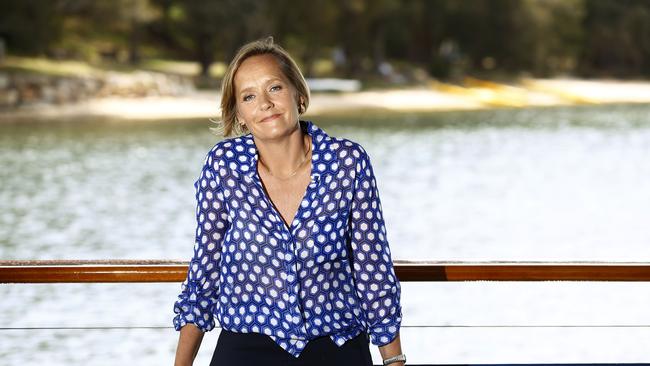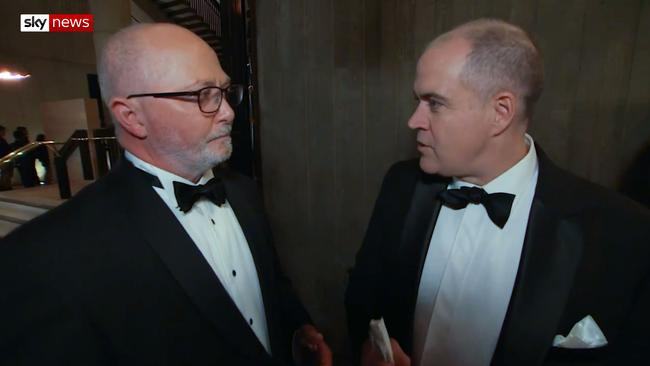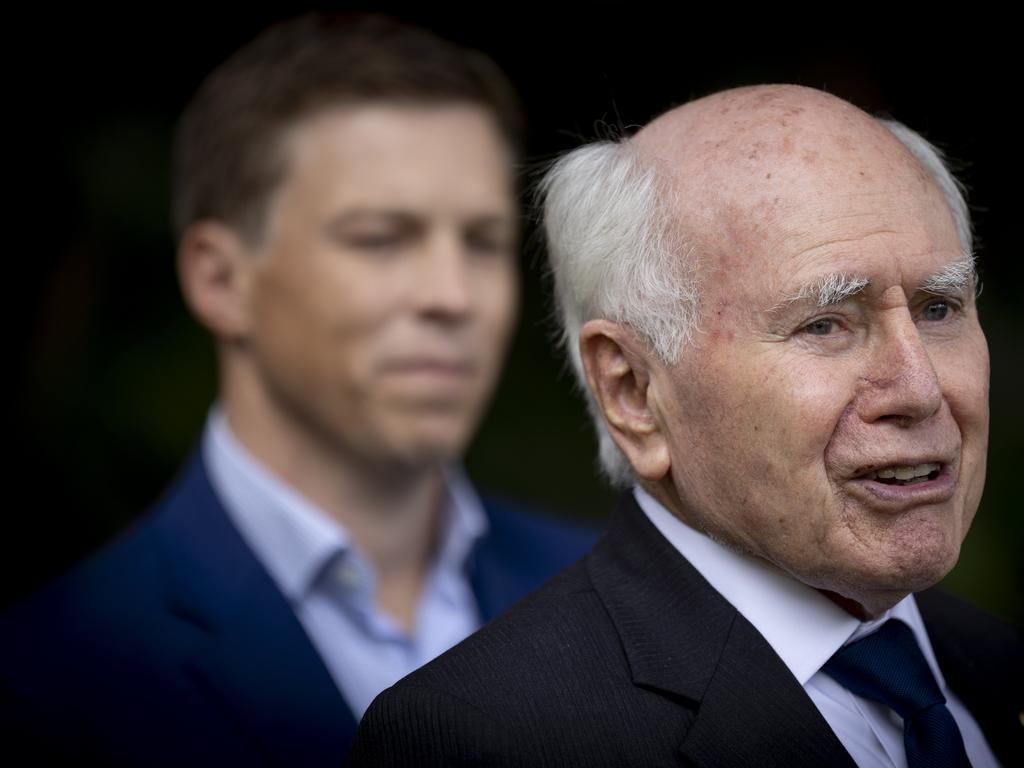
Too much Sarah is never enough, apparently, so after finishing her regular gig the ABC screened The ABC Of: Sarah Ferguson, hosted by David Wenham. The 30-minute show featured old clips of Sarah’s most important stories and early footage of when Sarah met Tony – husband Tony Jones that is.
Kenny’s hour-long documentary, Your ABC Exposed, essentially concluded ABC staff run the ABC. Or, as Sydney Institute director Gerard Henderson has been arguing for decades in his weekly Friday Media Watch Dog blog, “It’s their ABC”.
A highlight in Kenny’s show was an impromptu interview with ABC managing director David Anderson after the Andrew Olle lecture in Sydney in June. Anderson claimed he was happy to talk to Kenny on air, but in fact had already declined several times and did so again after that unscheduled chat.
As a long-time newspaper editor I have been interviewed by 7.30 and by ABC TV and radio news several times. My old boss, former News Corp chief executive John Hartigan, fronted 7.30 in 2011 to defend the media company against spurious misconduct allegations from the Gillard government that surfaced during the UK phone hacking inquiry.
Yet the ABC’s effective editor-in-chief won’t do what most other editors have to at some time. Previous journalists-cum-managing directors such as David Hill and Brian Johns were often interviewed about internal problems. The last MD to allow himself to be held publicly accountable was former Fairfax editor-in-chief Mark Scott, who left in 2016.
This column last November looked at the role of the ABC Act and Charter. It argued even four-term conservative PM John Howard had failed to shift the organisation’s culture, despite appointing close friend Donald McDonald as chairman for two five-year terms. Howard also added vocal ABC conservative critics to the board: former Victorian Liberal state director Michael Kroger in 1998, IPA anthropologist Ron Brunton (2003), this paper’s Janet Albrechtsen (2005) and Quadrant editor Keith Windschuttle (2006).

Howard appointed former Australian Stock Exchange director Maurice Newman as chairman in January 2007. Newman told the Kenny Report on Wednesday, discussing the previous night’s documentary, that the ABC’s staff had effectively ignored him after Labor won the 2007 election, knowing he would be gone in 2012. He said the ABC was a staff collective and “there is nothing that will change that because it is deeply embedded in the culture”.
Albrechtsen and former MD Jonathon Shier told Kenny that staff had schmoozed previous board members and MDs to get them on-side. It’s clearly worked with the current board.
Conservatives often claim, wrongly, that the law requires ABC journalists to be fair and balanced. Neither the ABC Act nor the Charter that sits in Section 6 of the Act actually make any such demand of journalists.
Section 8 of the Act, Duties of the Board, says it is “The duty of the board … to ensure … news and information is accurate and impartial according to the recognised standards of objective journalism”. That is, directors, many of whom have zero media experience, have a level of editorial oversight that no ABC journalist is charged with.
Conservative critics also claim the main editorial role effectively sits with the managing director. Maybe, maybe not. Sections 9 and 10 define many tasks for the MD but there is no explicit statement the MD must act as the chief editorial executive.
Kroger told this column last November the Coalition had wasted eight years failing to reform the ABC and was paying the price as the corporation openly campaigned against it. Kroger said Section 8 of the Act needed to be redrafted: “You have to strengthen Section 8 because the directors are liable for the corporation’s behaviour but what liability is that? If the Act has been breached the directors face no penalty.”
One of the best examples of reluctance at the ABC to take ultimate editorial responsibility during my time running this newspaper actually concerned Kenny.
He received a payout and apology in June 2014 after legal action over a skit in September 2013 on The Chaser’s The Hamster Decides program, that portrayed him as having sex with a dog. Then ABC MD Mark Scott eventually apologised and paid up. Critics of Kenny’s legal action did not know that before he decided to sue I told this newspaper’s lawyer to make an offer to the ABC: I would walk down to Ultimo, have a cup of tea with Scott and try to work out a deal.
In commercial media, many legal actions are settled by discussions between the editor and the complainant. Not only was The Australian’s lawyer confronted by a whole team from ABC legal, my serious offer never even received a response.
This brings us to one of the stars of Kenny’s doco, Louise Milligan, a former journalist on this newspaper whose ABC work has been at the centre of several legal controversies: her pursuit of Cardinal George Pell, her allegations against former Coalition ministers Christian Porter and Alan Tudge, and her defamation of former federal MP Andrew Laming.
Despite several warnings to ABC staff about how they use Twitter, Milligan last year retweeted a false allegation Laming had taken an “upskirting” photo of a woman. The woman was in fact wearing shorts. Laming said he was not seeking a legal fight but a correction.
This cost the ABC $79,000 in damages plus more than $100,000 in legal bills for something that could have been solved by a single phone call and apology on Twitter. Network Ten journalists Lisa Wilkinson, Tegan George and Georgie Dent, Crikey’s William Bowe, News Corp’s Eliza Barr, and politicians Derryn Hinch, Kristina Keneally, Sarah Hanson-Young and Murray Watt, all apologised for falsely accusing Laming of “upskirting”. Milligan did not.
In The Australian on March 4, Albrechtsen revealed romantic texts from former staffer Rachelle Miller to former education minister Alan Tudge. Milligan’s report on Four Corners in November 2020 portrayed Miller as a victim of her boss’s attentions. Subsequent ABC shows reported Tudge’s texts to Miller but not Miller’s to him. The ABC board and MD should have ensured texts from both Miller and Tudge were published.
Four Corners and 7.30 have never apologised to Pell, despite a 7-0 High Court finding in April 2020 overturning his conviction.
On April 23, The Australian revealed that Four Corners had carefully vetted and edited a dossier and personal diaries written by “Kate” – the woman who Milligan reported was allegedly raped, aged 16, by a 17-year-old Porter – to remove material that would cast doubt on the accuser’s state of mind.
Porter has left politics, but Kate’s parents have also said they did not believe the allegation, which Porter vehemently denies.
Back to last Tuesday. While Sarah Ferguson has had a wonderful career, the ABC should have ensured she was asked about a couple of her recent Four Corners clangers, most notably, the three-part “Story of the Century” in 2018 about false allegations that Donald Trump had colluded with Russia.
Remember too Four Corners’ controversial cash payment to a convicted left wing activist for video of the 2021 Capitol riots for Ferguson’s “Downfall” episode on Trump’s loss. The ABC has not apologised for either.








As if to prove one of the conclusions drawn about the ABC in Sky News host Chris Kenny’s documentary last Tuesday, the national broadcaster scheduled a soft profile interview with 7.30 host Sarah Ferguson for the same 8pm timeslot.